By Leen Randell
Updated: Jul 04, 2024
10 Best Herbal Decoctions For Sleep Deprivation
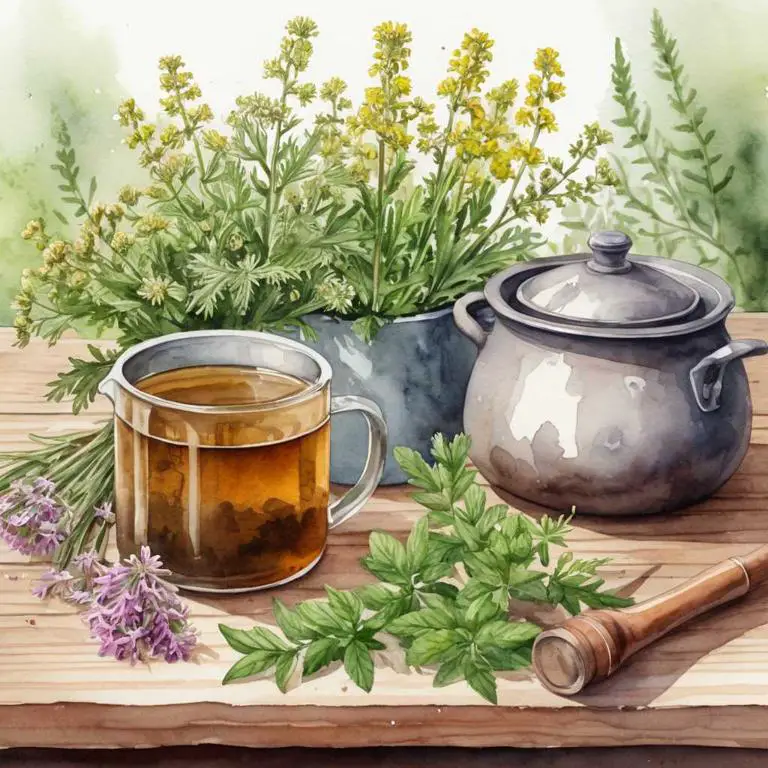
Herbal decoctions for sleep deprivation are a natural and effective way to promote relaxation and improve the quality of sleep.
These decoctions are made by steeping herbs in hot water, releasing their medicinal properties and soothing effects on the body. By incorporating herbal decoctions into one's daily routine, individuals can alleviate symptoms of sleep deprivation such as insomnia, restlessness, and fatigue. For example, chamomile, lavender, and valerian root decoctions have been shown to calm the mind and body, reducing stress and anxiety that may be contributing to poor sleep.
By enjoying a warm cup of herbal decoction before bed, individuals can improve their overall sleep quality, leading to increased energy levels, enhanced mood, and a better overall sense of well-being.
The following article describes in detail the most important decoctions for sleep deprivation, including medicinal properties, parts of herbs to use, and recipes for preparations.
- 1. Valeriana officinalis
- 2. Melissa officinalis
- 3. Passiflora incarnata
- 4. Scrophularia nodosa
- 5. Glycyrrhiza glabra
- 6. Tilia platyphyllos
- 7. Camellia sinensis
- 8. Piper methysticum
- 9. Lavandula angustifolia
- 10. Matricaria chamomilla
- What is the best combination of herbal decoctions to use for sleep deprivation?
- What ailments similar to sleep deprivation are treated with herbal decoctions?
1. Valeriana officinalis
Valerian decoctions helps with sleep deprivation because it promotes relaxation and calms the mind, allowing individuals to fall asleep faster.
The herb's sedative properties work by reducing stress and anxiety levels, making it easier for the body to enter a deep sleep state.
Additionally, valerian root has been shown to increase the production of serotonin, a neurotransmitter that helps regulate sleep-wake cycles, further improving the quality of sleep and reducing the likelihood of insomnia.
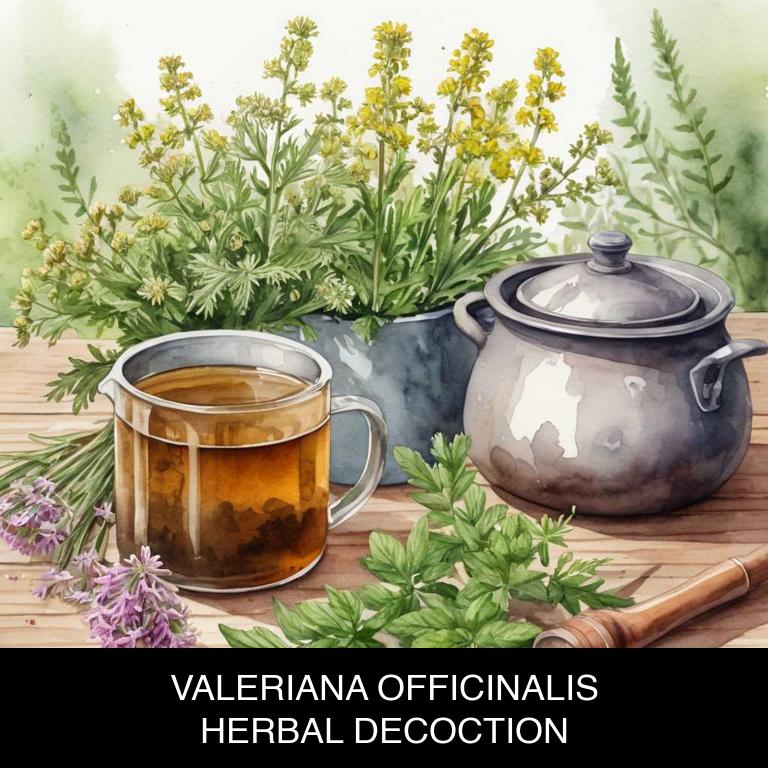
Medicinal Constituents
The list below shows the primary medicinal constituents in Valeriana officinalis decoctions that help with sleep deprivation.
- Valerenic acid: It has a sedative effect by acting on the GABA receptors in the brain, promoting relaxation and reducing anxiety, which can contribute to sleep deprivation.
- Isovaleric acid: It has been found to have a calming effect on the nervous system, reducing stress and anxiety levels, and promoting a sense of calmness that can aid in falling asleep.
- Valeranone: It has been shown to have a sedative effect by acting on the GABA receptors in the brain, as well as having a depressant effect on the central nervous system, both of which can help alleviate sleep deprivation.
Parts Used
The list below shows the primary parts of valerian used to make decoctions for sleep deprivation.
- Roots: They are the primary part used due to their high concentration of valerenic acid, a key compound responsible for the sedative effects of the plant.
- Stems: The stems contain valerenic acid and other bioactive compounds, making them a valuable part for sleep aid and stress relief.
- Leaves: Leaves also contain valerenic acid and other beneficial compounds, contributing to their use in decoctions for sleep promotion and relaxation.
Quick Recipe
The following recipe gives a procedure to make a basic valerian for sleep deprivation.
- Harvest the roots of valeriana officinalis from a trusted source in late summer or early fall.
- Dry the harvested roots at a temperature below 40 degrees celsius for 1 to 2 weeks.
- Grind the dried valeriana officinalis roots into a fine powder using a mortar and pestle.
- Steep 1 to 2 teaspoons of the powdered root in 1 cup of boiling water for 5 to 10 minutes.
- Strain the decoction using a cheesecloth or fine-mesh sieve and discard the solids immediately.
2. Melissa officinalis
Lemon balm decoctions helps with sleep deprivation because it calms the mind and body, promoting a sense of relaxation and reducing stress levels.
The herbal infusion's sweet, citrusy scent can also help to soothe the senses and quiet a racing mind, making it easier to fall asleep.
Additionally, lemon balm has a natural sedative effect that can help regulate sleep patterns, ensuring a restful night's sleep and improved quality of rest.
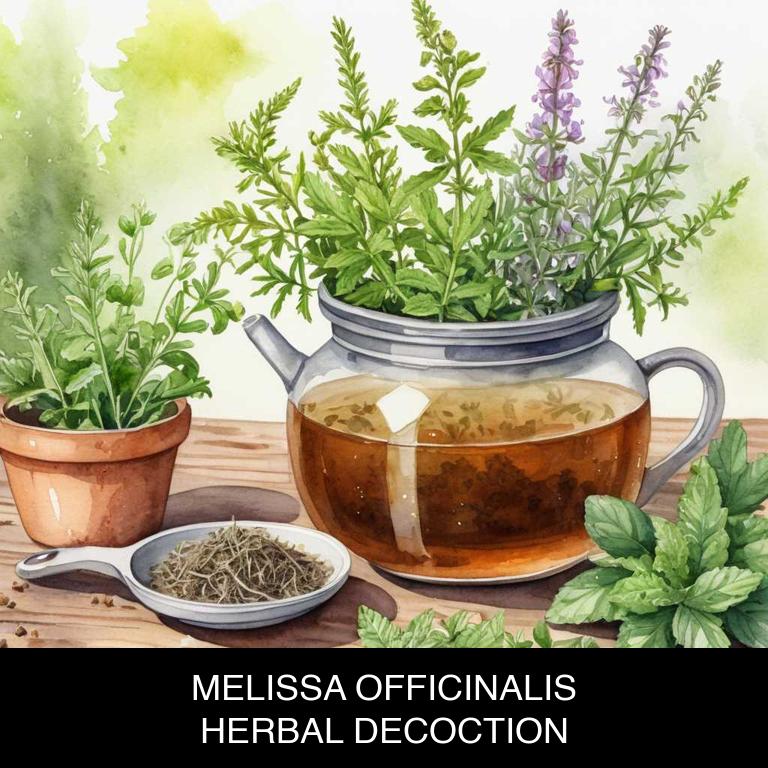
Medicinal Constituents
The list below shows the primary medicinal constituents in Melissa officinalis decoctions that help with sleep deprivation.
- Rosmarinic acid: A phenolic compound that helps reduce stress and anxiety, promoting relaxation and improving sleep quality by inhibiting the production of stress hormones like cortisol.
- Linalool: A terpene with sedative and anxiolytic properties that helps calm the mind and body, leading to a deeper and more restful sleep by reducing anxiety and promoting relaxation.
- Volatile oils: A combination of terpene and sesquiterpene compounds that exhibit sedative, anxiolytic, and anti-inflammatory properties, contributing to improved sleep quality by reducing inflammation and promoting relaxation.
Parts Used
The list below shows the primary parts of lemon balm used to make decoctions for sleep deprivation.
- Leaves: They are commonly used in decoctions to promote relaxation and improve sleep quality due to their calming and sedative properties.
- Flowers: The flowers are used in decoctions to help reduce stress and anxiety, which can contribute to sleep deprivation, and promote a restful night's sleep.
- Roots: The roots are used in decoctions to provide a deeper sense of relaxation and calmness, which can help individuals overcome sleep deprivation and improve their overall sleep quality.
Quick Recipe
The following recipe gives a procedure to make a basic lemon balm for sleep deprivation.
- Gather fresh melissa officinalis leaves and stems from a trusted herbal source weighing around 25 grams.
- Chop the herb into small pieces to increase the surface area for infusion.
- Combine the chopped melissa with 250 milliliters of boiling water in a heat-resistant glass container.
- Steep the mixture for 5 to 7 minutes or until the liquid has cooled to a comfortable temperature.
- Strain the decoction through a cheesecloth or a fine-mesh sieve into a clean glass container.
3. Passiflora incarnata
Maypop decoctions helps with sleep deprivation because they contain a unique combination of flavonoids, alkaloids, and saponins that work synergistically to promote relaxation and reduce stress levels.
The decoction's calming properties help quiet the mind and body, making it easier to fall asleep and stay asleep throughout the night.
Additionally, maypop's ability to regulate cortisol levels helps alleviate anxiety and restlessness, allowing for a deeper and more restorative sleep.
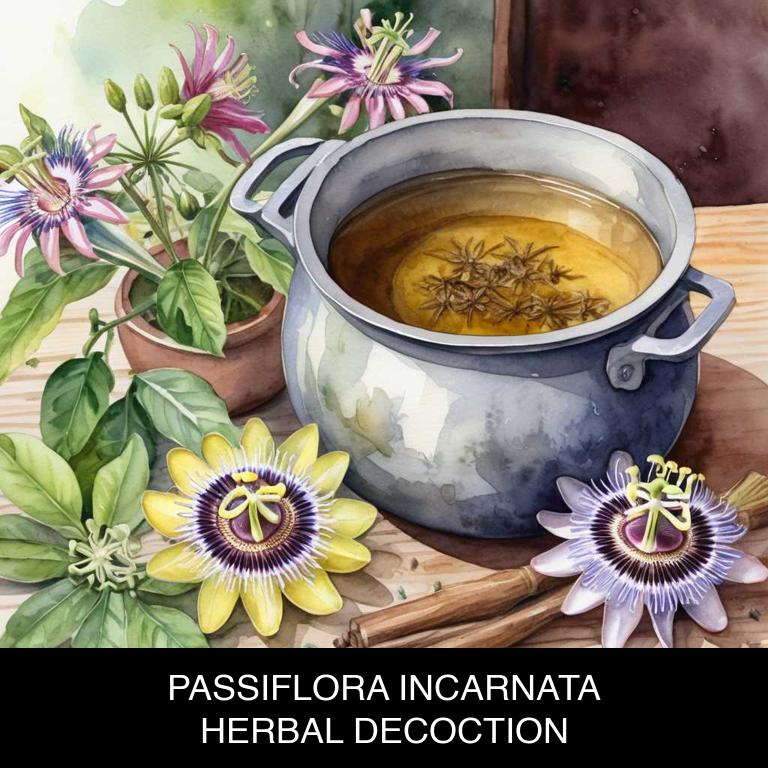
Medicinal Constituents
The list below shows the primary medicinal constituents in Passiflora incarnata decoctions that help with sleep deprivation.
- Flavonoids: These compounds have a sedative effect, helping to reduce anxiety and promote relaxation, making it easier to fall asleep.
- Harmane alkaloid: Harmane is a naturally occurring indole alkaloid that has been shown to have sedative properties, contributing to improved sleep quality by reducing stress and promoting relaxation.
- Rotundifolione: This lignan has been found to have a sedative effect, helping to reduce anxiety and promote sleep by inhibiting the activity of neurons in the brain that contribute to stress and insomnia.
Parts Used
The list below shows the primary parts of maypop used to make decoctions for sleep deprivation.
- Roots: The most used part of Passiflora incarnata for sleep decoctions due to their high concentration of harman alkaloids, which have sedative properties.
- Leaves: The leaves are used for their high content of flavonoids and other bioactive compounds that promote relaxation and help with sleep deprivation.
- Fruits: The fruits of Passiflora incarnata contain a high amount of vitamins, minerals, and antioxidants that contribute to the overall calming and sleep-inducing effects of the decoctions.
Quick Recipe
The following recipe gives a procedure to make a basic maypop for sleep deprivation.
- Gather 1-2 ounces of dried passiflora incarnata flowers or 3-4 ounces of fresh flowers.
- Combine the passiflora incarnata flowers with 32 ounces of water in a saucepan.
- Bring the mixture to a boil and then reduce the heat to a simmer for 10-15 minutes.
- Strain the decoction through a cheesecloth or a fine-mesh sieve into a bowl or container.
- Allow the decoction to cool before transferring it to a dark glass bottle for storage.
4. Scrophularia nodosa
Figwort decoctions helps with sleep deprivation because they have a sedative effect on the body, promoting relaxation and calming the mind.
The antioxidants present in figwort work to reduce inflammation, which can contribute to restlessness and insomnia. Additionally, figwort has been shown to regulate serotonin levels, helping to promote a sense of calm and tranquility that is conducive to a good night's sleep.
By addressing these underlying factors, figwort decoctions provide a natural remedy for overcoming sleep deprivation and promoting a restful and rejuvenating sleep.
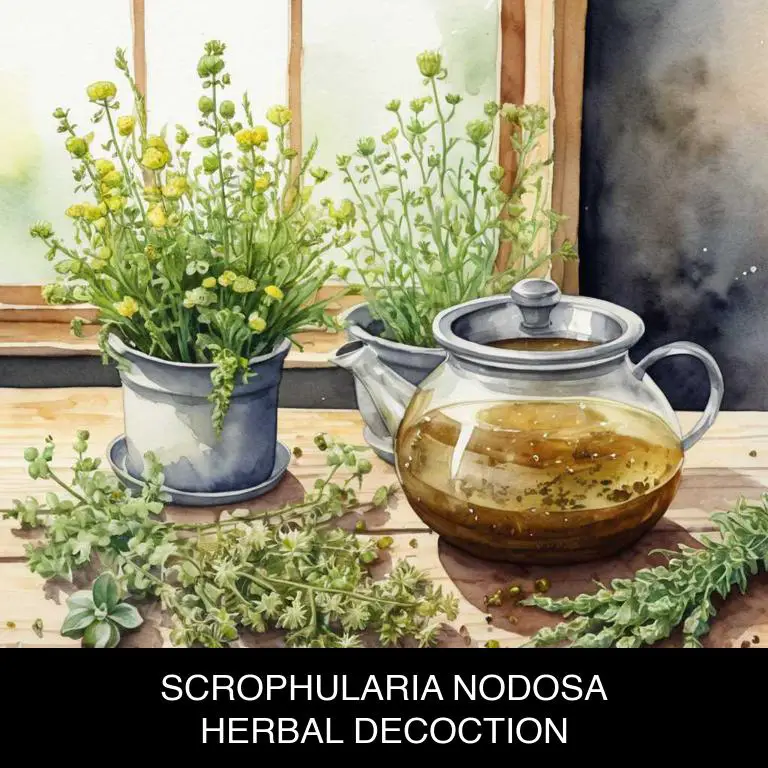
Medicinal Constituents
The list below shows the primary medicinal constituents in Scrophularia nodosa decoctions that help with sleep deprivation.
- Iridoid glycosides: Iridoid glycosides, particularly scropolioside, possess sedative and hypnotic properties, which can help alleviate insomnia and promote relaxation, contributing to improved sleep quality.
- Phenolic acids: Phenolic acids, such as caffeic acid and ferulic acid, have been shown to possess antioxidant and anti-inflammatory properties, which may help reduce oxidative stress and inflammation associated with sleep disorders, promoting a restful night's sleep.
- Flavonoids: Kaempferol, a flavonoid found in Scrophularia nodosa, has been demonstrated to possess sedative and anxiolytic effects, helping to reduce anxiety and stress, which are common contributing factors to sleep deprivation.
Parts Used
The list below shows the primary parts of figwort used to make decoctions for sleep deprivation.
- Roots: The roots of Scrophularia nodosa are used due to their sedative properties, which help in inducing relaxation and promoting a restful sleep.
- Leaves: The leaves are used in decoctions for their calming effects, which can aid in reducing anxiety and promoting a peaceful sleep.
- Flowers: The flowers of Scrophularia nodosa are used to create a soothing decoction, which is believed to help with restful sleep and relaxation.
Quick Recipe
The following recipe gives a procedure to make a basic figwort for sleep deprivation.
- Harvest 10-20 grams of scrophularia nodosa roots and leaves from a trusted source in the morning.
- Rinse the scrophularia nodosa roots and leaves gently with cold water for 2-3 minutes.
- Chop the scrophularia nodosa roots and leaves into small pieces to increase their surface area for decoction.
- Combine the chopped scrophularia nodosa roots and leaves with 500 milliliters of water in a saucepan and bring to a boil.
- Reduce heat to a simmer and let the decoction steep for 10-15 minutes before straining and discarding the solids.
5. Glycyrrhiza glabra
Licorice decoctions helps with sleep deprivation because it contains compounds like glycyrrhizin, which have a sedative effect on the body.
The decoction can calm the nervous system and reduce stress levels, making it easier to fall asleep. Additionally, licorice root has been shown to regulate cortisol levels, helping to alleviate anxiety and promote relaxation.
As a result, individuals who drink licorice decoctions before bedtime may experience improved sleep quality and duration.

Medicinal Constituents
The list below shows the primary medicinal constituents in Glycyrrhiza glabra decoctions that help with sleep deprivation.
- Licoricidin: Licoricidin is a flavonoid glycoside that has been shown to have a sedative effect, helping to reduce stress and promote relaxation, which can aid in overcoming sleep deprivation.
- Licorice flavonoid: Licorice flavonoid has been found to have anti-inflammatory and antioxidant properties, which can help reduce inflammation and oxidative stress that may contribute to sleep disorders.
- Glycyrrhizin: Glycyrrhizin is a triterpenoid saponin that has been shown to have a calming effect, reducing anxiety and stress levels, which can help individuals suffering from sleep deprivation to fall asleep and stay asleep.
Parts Used
The list below shows the primary parts of licorice used to make decoctions for sleep deprivation.
- Roots: They contain glycyrrhizin, a compound that helps reduce stress and anxiety, promoting relaxation and sleep.
- Leaves: They have antispasmodic and sedative properties, which can help calm the nervous system and induce sleep.
- Barks: They contain flavonoids and phenolic acids that have a soothing effect, reducing stress and anxiety, and promoting a good night's sleep.
Quick Recipe
The following recipe gives a procedure to make a basic licorice for sleep deprivation.
- Harvest 4-6 roots of glycyrrhiza glabra, clean them thoroughly, and cut them into small pieces.
- Combine the root pieces with 4 cups of water in a medium-sized saucepan and bring to a boil.
- Reduce heat to a simmer for 10-15 minutes, allowing the decoction to infuse and release its properties.
- Strain the decoction using a cheesecloth or a fine-mesh sieve into a clean container.
- Store the decoction in the refrigerator for up to 3 days, allowing it to cool before use.
6. Tilia platyphyllos
Broad-leaved lime decoctions helps with sleep deprivation because of its unique composition, which includes flavonoids and phenolic acids that promote relaxation and reduce stress levels.
These compounds have a sedative effect on the nervous system, calming the mind and body, making it easier to fall asleep and stay asleep. Additionally, broad-leaved lime decoction has anti-inflammatory properties that can help alleviate any physical discomfort or pain that may be disrupting sleep.
As a result, individuals who consume broad-leaved lime decoctions may experience improved sleep quality and duration.
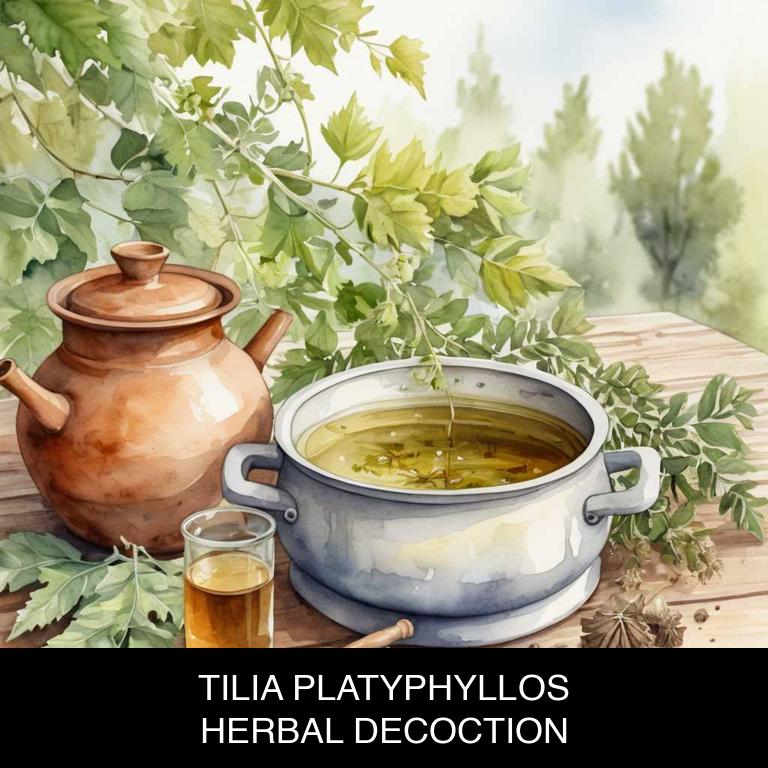
Medicinal Constituents
The list below shows the primary medicinal constituents in Tilia platyphyllos decoctions that help with sleep deprivation.
- Flavonoids: These plant-based compounds help alleviate stress and anxiety that can contribute to sleep deprivation, promoting relaxation and a calmer state.
- Terpenoids: Specifically, terpenoids like linalool and linalyl acetate in Tilia platyphyllos have been shown to have sedative and anxiolytic properties, helping to reduce stress and promote a restful night's sleep.
- Triterpenoids: Triterpenoids, including ursolic and oleanolic acids, have been found to possess anti-inflammatory and antioxidant properties, which can help reduce inflammation and oxidative stress that may interfere with sleep.
Parts Used
The list below shows the primary parts of broad-leaved lime used to make decoctions for sleep deprivation.
- Leaves: Used to make decoctions for sleep deprivation due to their sedative properties.
- Flowers: Used to make decoctions for sleep deprivation due to their calming and soothing effects.
- Barks: Used to make decoctions for sleep deprivation due to their ability to promote relaxation and reduce stress.
Quick Recipe
The following recipe gives a procedure to make a basic broad-leaved lime for sleep deprivation.
- Gently gather 30-60 grams of dried tilia platyphyllos leaves and flowers for a decoction.
- Rinse the dried herbal material with cold water to remove any impurities from storage.
- Combine the rinsed tilia platyphyllos with 1 liter of water in a saucepan.
- Bring the water to a boil then reduce the heat to a gentle simmer for 5-10 minutes.
- Strain the decoction through a cheesecloth or a fine-mesh sieve into a clean container.
7. Camellia sinensis
Tea decoctions helps with sleep deprivation because they promote relaxation, calmness, and a sense of tranquility.
The subtle flavors and aromas of herbal teas such as chamomile, lavender, and valerian root calm the mind and body, making it easier to fall asleep and stay asleep throughout the night.
Additionally, these teas can help regulate the body's natural sleep-wake cycle by stimulating the production of serotonin and melatonin, the hormones that govern our sleep patterns.
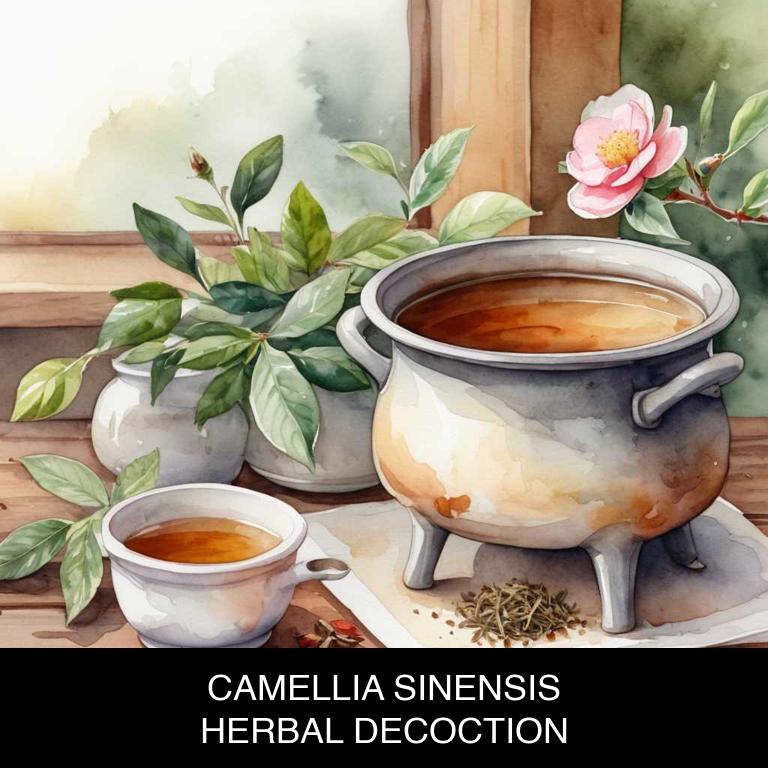
Medicinal Constituents
The list below shows the primary medicinal constituents in Camellia sinensis decoctions that help with sleep deprivation.
- Theaflavins: These polyphenolic compounds help with sleep deprivation by reducing oxidative stress and inflammation in the brain, promoting relaxation and improving sleep quality.
- Catechins: These catechins have a sedative effect by inhibiting the activity of excitatory neurotransmitters, such as glutamate and aspartate, which can contribute to wakefulness and insomnia.
- L-theanine: This non-protein amino acid promotes sleep by increasing the production of neurotransmitters that regulate sleep, such as GABA and serotonin, while also reducing the activity of wakefulness-promoting neurotransmitters like dopamine and norepinephrine.
Parts Used
The list below shows the primary parts of tea used to make decoctions for sleep deprivation.
- Leaves: Rich in L-theanine, a compound that promotes relaxation and helps regulate sleep patterns.
- Flowers: Contain flavonoids and other antioxidants that can help reduce stress and promote a calm state, making it easier to fall asleep.
- Buds: Have a high content of caffeine-free flavonoids, which may help regulate the body's internal clock and improve sleep quality.
Quick Recipe
The following recipe gives a procedure to make a basic tea for sleep deprivation.
- Harvest fresh camellia sinensis leaves from a reliable source in early morning or late afternoon.
- Rinse 2-3 teaspoons of camellia sinensis leaves in filtered water to remove impurities and dust.
- Combine the rinsed camellia sinensis leaves with 8 ounces of filtered water in a saucepan.
- Boil the mixture over high heat for 3-5 minutes then reduce heat to a simmer.
- Steep the camellia sinensis leaves for 5-7 minutes then strain the decoction through a fine mesh sieve.
8. Piper methysticum
Kava decoctions helps with sleep deprivation because they promote relaxation and calmness, making it easier to fall asleep.
The active compounds in kava root, such as kavapyrones, interact with neurotransmitters like GABA and serotonin, which regulate sleep and relaxation. This interaction helps slow down racing thoughts, reduces anxiety, and calms the mind and body, allowing individuals to drift off to sleep more easily.
As a result, kava decoctions can help improve sleep quality, duration, and overall well-being for those struggling with sleep deprivation.
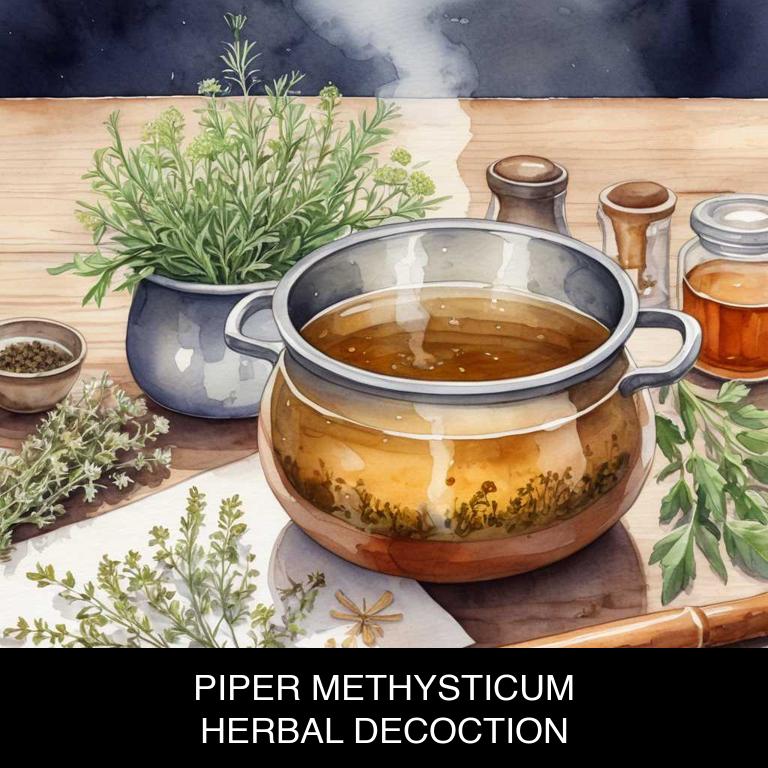
Medicinal Constituents
The list below shows the primary medicinal constituents in Piper methysticum decoctions that help with sleep deprivation.
- Kavain: Kavain is a pyrone alkaloid found in Piper methysticum that has been shown to have a sedative effect on the nervous system, potentially helping with sleep deprivation by reducing anxiety and promoting relaxation.
- Yaconene: Yaconene is a sesquiterpene found in Piper methysticum that has been demonstrated to have anxiolytic and sedative properties, which could contribute to improved sleep quality by reducing stress and promoting relaxation.
- Kavain glycosides: These glycoside compounds are converted into kavain in the body, and their anxiolytic and sedative effects may help with sleep deprivation by promoting relaxation and reducing anxiety.
Parts Used
The list below shows the primary parts of kava used to make decoctions for sleep deprivation.
- Rhyzomes: Rhyzomes contain a high concentration of kavalactones, which are responsible for the plant's sedative and relaxing properties.
- Leaves: Leaves are also rich in kavalactones and are often used to make decoctions that promote relaxation and improve sleep quality.
- Roots: Roots, although less studied, are sometimes used to make decoctions that have a sedative effect, possibly due to their kavalactone content.
Quick Recipe
The following recipe gives a procedure to make a basic kava for sleep deprivation.
- Harvest 1-2 ounces of fresh or dried piper methysticum leaves and stems.
- Clean and chop the harvested plant material into small pieces.
- Combine the chopped plant material with 32 ounces of water in a saucepan.
- Boil the mixture for 10-15 minutes then reduce the heat to a simmer.
- Strain the decoction using a cheesecloth or fine-mesh sieve and discard the solids.
9. Lavandula angustifolia
English lavender decoctions helps with sleep deprivation because they promote relaxation and calmness, allowing the mind and body to unwind after a long day.
The soothing properties of lavender help to reduce anxiety and stress levels, making it easier to fall asleep.
Additionally, lavender's calming effects can help regulate the body's natural sleep-wake cycle, also known as circadian rhythms, leading to a deeper and more restful sleep.
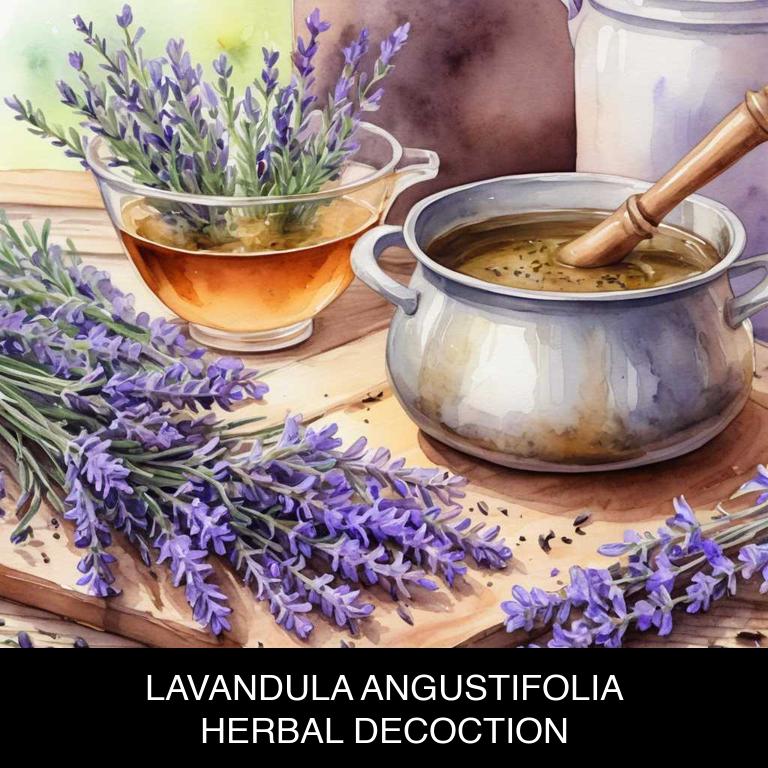
Medicinal Constituents
The list below shows the primary medicinal constituents in Lavandula angustifolia decoctions that help with sleep deprivation.
- Linalool: A terpene with sedative and anxiolytic properties that helps to reduce stress and anxiety levels, promoting relaxation and improving sleep quality.
- Linalyl acetate: A terpene that contributes to the calming and soothing effects of Lavandula angustifolia, helping to reduce muscle tension and promote a peaceful sleep environment.
- Luteolin: A flavonoid with a sedative effect that may help to regulate sleep patterns, reduce inflammation, and improve the overall sleep quality by reducing stress and anxiety.
Parts Used
The list below shows the primary parts of english lavender used to make decoctions for sleep deprivation.
- Flowers: They are used to make decoctions for sleep deprivation due to their calming and sedative properties.
- Leaves: They are used to make decoctions for sleep deprivation due to their soothing and relaxing effects.
- Stems: They are used to make decoctions for sleep deprivation due to their ability to promote a peaceful and restful sleep.
Quick Recipe
The following recipe gives a procedure to make a basic english lavender for sleep deprivation.
- Gather 1 ounce of dried lavandula angustifolia flowers and place them in a clean glass container.
- Combine the dried flowers with 2 cups of boiling water and steep for 5-7 minutes.
- Strain the mixture through a cheesecloth into a separate container to remove the solids.
- Discard the solids and store the decoction in the refrigerator for up to 3 days.
- Use 1/4 cup of the decoction as needed to promote relaxation and reduce stress levels.
10. Matricaria chamomilla
Chamomile decoctions helps with sleep deprivation because its calming properties promote relaxation, reducing anxiety and stress levels.
The soothing aroma of chamomile tea can calm a racing mind, making it easier to fall asleep. Additionally, chamomile's sedative effects can slow down the nervous system, helping to regulate the body's natural sleep-wake cycle.
As a result, herbal chamomile decoctions can help individuals with insomnia and other sleep disorders drift off to sleep more easily, leading to improved restful sleep and increased energy levels throughout the day.
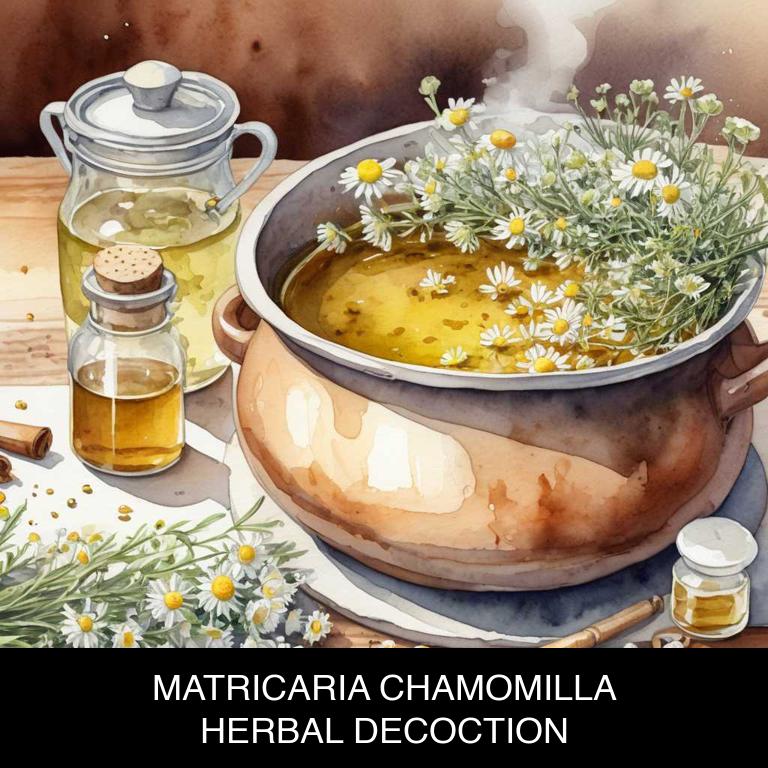
Medicinal Constituents
The list below shows the primary medicinal constituents in Matricaria chamomilla decoctions that help with sleep deprivation.
- Apigenin: A flavonoid, apigenin helps with sleep deprivation by acting as a GABA receptor agonist, promoting relaxation and reducing anxiety.
- Luteolin: A flavonoid, luteolin helps with sleep deprivation by reducing inflammation and oxidative stress, contributing to a calming effect and improved sleep quality.
- Chamazulene: A sesquiterpene, chamazulene helps with sleep deprivation by exhibiting sedative and anxiolytic properties, promoting relaxation and reducing restlessness.
Parts Used
The list below shows the primary parts of chamomile used to make decoctions for sleep deprivation.
- Flowers: The flowers of Matricaria chamomilla are the most used part to make decoctions for sleep deprivation due to their high apigenin content, which promotes relaxation and sedation.
- Leaves: The leaves of Matricaria chamomilla are also commonly used to make decoctions for sleep deprivation because of their calming properties, which help to reduce anxiety and promote a good night's sleep.
- Seeds: The seeds of Matricaria chamomilla contain apigenin and other sleep-promoting compounds, making them a useful part in decoctions to help alleviate sleep deprivation.
Quick Recipe
The following recipe gives a procedure to make a basic chamomile for sleep deprivation.
- Gather 2-3 teaspoons of dried matricaria chamomilla flowers for a standard decoction.
- Combine the dried flowers with 1 liter of boiling water and let steep for 5-10 minutes.
- Strain the mixture through a cheesecloth or a fine-mesh sieve to remove the solids.
- Store the decoction in a glass container in the refrigerator for up to 24 hours.
- Drink 1/2 cup of the decoction 2-3 times a day for optimal benefits.
What is the best combination of herbal decoctions to use for sleep deprivation?
The best combination of herbal decoctions that help with sleep deprivation is a blend of Valerian root, Chamomile flowers, and Lavender buds.
Valerian root promotes relaxation and calms the mind, while Chamomile soothes the nervous system and reduces anxiety. Lavender buds enhance the calming effects and promote a restful night's sleep. Steeping these herbs in a warm tea can help regulate sleep patterns and alleviate fatigue caused by sleep deprivation.
A balanced dosage and regular consumption can lead to improved sleep quality and overall well-being.
What ailments similar to sleep deprivation are treated with herbal decoctions?
Ailments similar to sleep deprivation that are treated with herbal decoctions are anxiety, stress, and fatigue.
Herbs like Ashwagandha, Ginseng, and Licorice Root are commonly used in decoctions to calm the mind and body, promoting relaxation and reducing feelings of exhaustion.
These herbs have adaptogenic properties, helping the body cope with daily stresses and promoting a sense of well-being.